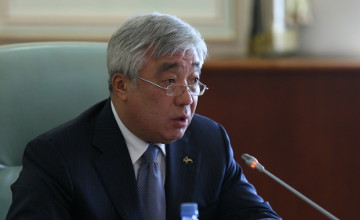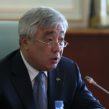
Kazakhstan’s Foreign Policy: One for All, or All for One?
Publication: Eurasia Daily Monitor Volume: 12 Issue: 18
By:

On December 26, 2014, Kazakhstani Foreign Minister Erlan Idrissov delivered an official briefing on the Ministry of Foreign Affairs’ 2014 activities. He provided a broad overview of Kazakhstan’s main foreign policy achievements and breakthroughs throughout the past year. Notably, President Nursultan Nazarbayev made eight official visits abroad and hosted 16 foreign heads of state in the country. The Kazakhstani foreign ministry conducted 80 briefings, 30 press conferences, 50 round tables, 8 business forums, 50 presentations and workshops, and around 30 photo exhibitions throughout the world. Among the country’s biggest achievements last year, Kazakhstan secured the support of 65 countries for its candidacy to a non-permanent-member seat on the United Nations Security Council for 2017–2018 (MFA.kz, December 26, 2014).
Minister Idrissov’s report also discusses the Russia-led Eurasian Economic Union (EEU), of which Kazakhstan is a founding member. According to Idrissov, the EEU functions on the principles of economic pragmatism, equality and mutual interests; and Astana views the EEU as, first of all, an economic integration mechanism that, in turn, will reinforce Kazakhstan’s statehood. The foreign minister highlighted that the EEU is being created voluntarily, with all of its members’ sovereignty in mind, thus reinforcing the message that Astana perceives the bloc as merely an economic alliance to boost trade and commerce (MFA.kz, December 26, 2014).
At the same time, Astana continues to seek stronger cooperation with the West. On October 9, Kazakhstan and the European Union reached a new Enhanced Partnership and Cooperation Agreement covering 29 different areas, including human rights, rule of law, crisis management, trade and climate change cooperation (Headline.kz, October 9, 2014). Idrissov explained that Kazakhstan seeks alliances and partnerships that are mutually beneficial. The win-win principle, he noted, can sometimes override complicated geopolitical realities in international relations (MFA.kz, December 26, 2014).
Furthermore, Idrissov highlighted Kazakhstan’s active involvement in the process of resolving the Ukraine crisis. Both Minsk and Astana appear to be competing to become the trusted mediator in the ongoing crisis. The two governments are close to Moscow, but Kazakhstan enjoys a more positive relationship with the EU than Belarus does (Central Asia Monitor, January 16). The fact that Russia, Ukraine, Germany and France had agreed to conduct negotiations in Astana—even though the meeting was ultimately postponed—demonstrates that Kazakhstan has reached new levels of trust among the major powers. Local experts believe that Astana can serve as the perfect platform for dialogue since it does not suffer from Minsk’s complicated relations with the West. As authorities continue to underline: Kazakhstan is happy to host the postponed summit at any convenient time for the negotiating parties (Tengrinews, January 16).
One local political expert, Dosym Satpayev, admits that Kazakhstan is attempting to position itself as a “Dialogue Bridge between the West and the East.” Kazakhstan has been developing this role through its active involvement in various international forums and organizations, including the Conference on Interaction and Confidence-Building Measures in Asia (CICA), the Organization for Security and Cooperation in Europe (OSCE) and others (Central Asia Monitor, January 16).
Idrissov’s end-of-year foreign policy briefing also mentioned Iranian President Hassan Rouhani’s first visit to Kazakhstan last September, which he made in the context of the newly opened Kazakhstan-Turkmenistan-Iran railway. During the opening ceremony, President Nazarbayev had stressed the importance of the railway connection to the development of regional markets as well as opening new opportunities for boosting regional economic cooperation with China and Russia (Tengrinews, December 4, 2014).
The foreign minister did not linger much on Kazakhstan’s own neighbors in Central Asia, though Idrissov did stress the importance of regional stability for Kazakhstan without going into many details. (MFA.kz, December 26).
Uzbekistani President Islam Karimov’s visit to Astana in November 2014, registered almost no notice from regional or international media, even though he and President Nazarbayev apparently spent an entire evening in face-to-face discussions behind closed doors. What was discussed is open to speculation, but their conversation may have revolved around regional security and, perhaps, devising a suitable strategy to answer these challenges (KTK.kz, November 25, 2014). Indeed, since 2010, Nazarbayev and Karimov have established a regular pattern of high-level meetings. These started taking on a systemic character in the context of the 2013 Strategic Partnership Agreement between the two countries, which raised numerous bilateral issues to a higher political level (Today.kz, December 4, 2014).
Among Kazakhstan’s other serious contacts with its Central Asian neighbors, one can mention Astana’s promise to assist Kyrgyzstan in joining the EEU. In particular, during President Almazbek Atambayev’s last visit to Astana, the two sides pledged to create a bilateral direct investment fund to finance border security improvements between the two countries (Newskaz.ru, November 7, 2014).
Yet, Idrissov said surprisingly little about regional cooperation among the Central Asian states in the context of the International Security Assistance Force’s (ISAF) withdrawal from Afghanistan. Kazakhstan continues to assist Afghanistan in educational training and humanitarian aid; but Idrissov’s remarks entirely skirted the subject of the war-torn country’s potential domestic destabilization, ongoing skirmishes on the Turkmenistani-Afghan border, or any other security implications of the Western militaries’ withdrawal for the Central Asian region (MFA.kz, December 26, 2014).
Equally, the foreign minister’s December briefing failed to highlight the fact that 300 Kazakhstani citizens are actively fighting with the Islamic State organization in the Middle East. Nor did he outline any of the steps the government is taking or plans to take in response (MFA.kz, December 26, 2014). The issue may be too delicate to discuss publicly.
Overall, Idrossov’s remarks make it difficult to identify Kazakhstan’s broad foreign policy goals or priorities. The main message to the world seems to be Kazakhstan’s multi-vector policy, but there are no clear indications as to whether Astana might take any serious shifts toward any specific direction. Nonetheless, the fact remains that, throughout 2014, the presidents of Kazakhstan and Russia met ten times, while the ambition to host the US President on the Kazakh steppe remains unfulfilled, despite numerous declarations of strategic interest. In fact, last year, only two Western heads of state arrived in Kazakhstan in an official capacity: French President Francois Hollande and Italy’s Prime Minister Matteo Renzi, along with the OSCE Chairperson-in-Office Didier Burkhalter. (MFA.kz, December 26, 2014).
If nothing else, Astana will likely remain a relatively constant and consistent player in its own neighborhood, always ready to offer a platform for long-term solutions and negotiations. Being a Eurasian state, Kazakhstan appears to keep its true priorities and foreign policy perspectives behind a closed curtain, revealing them only to its true allies.




